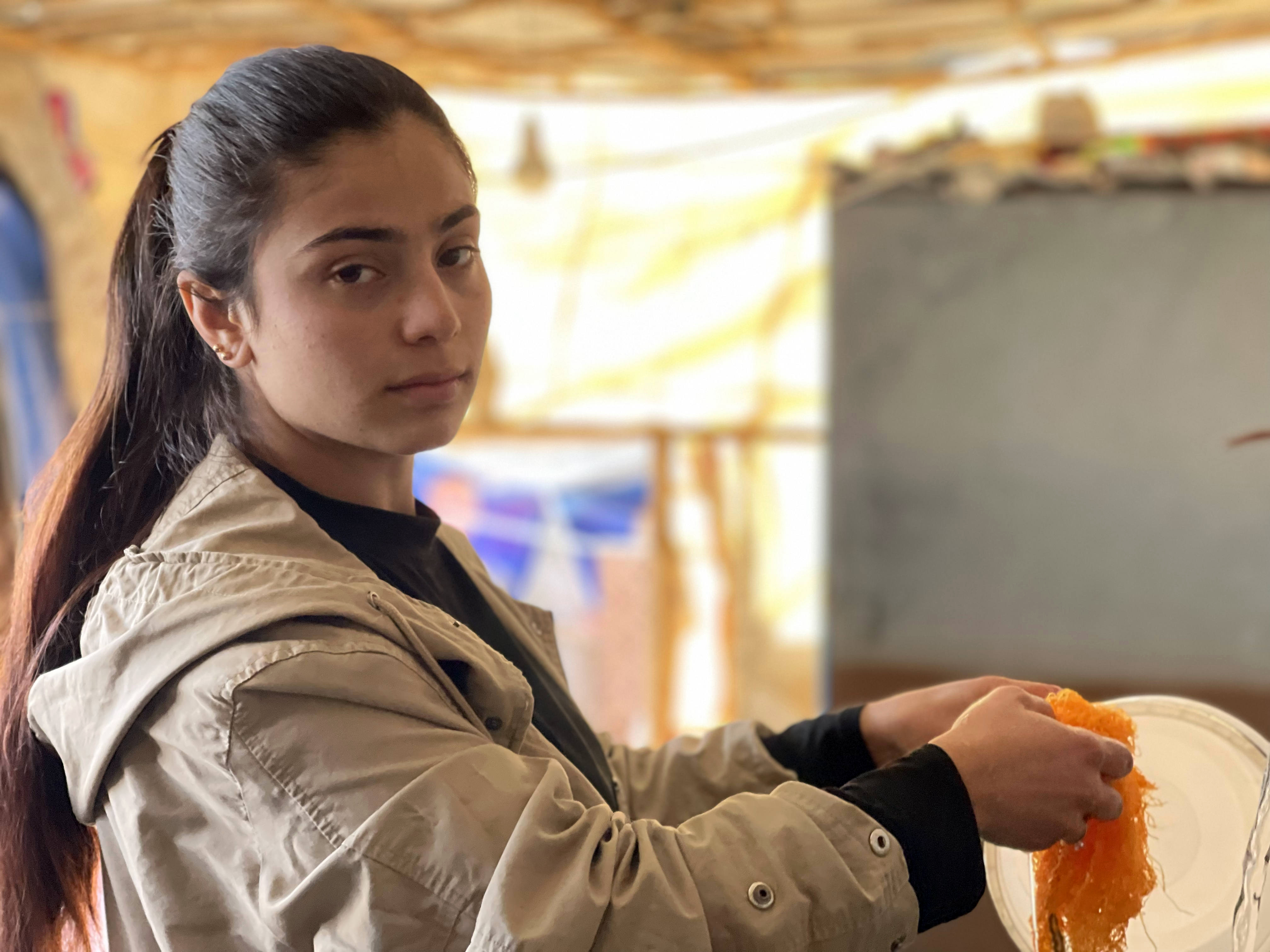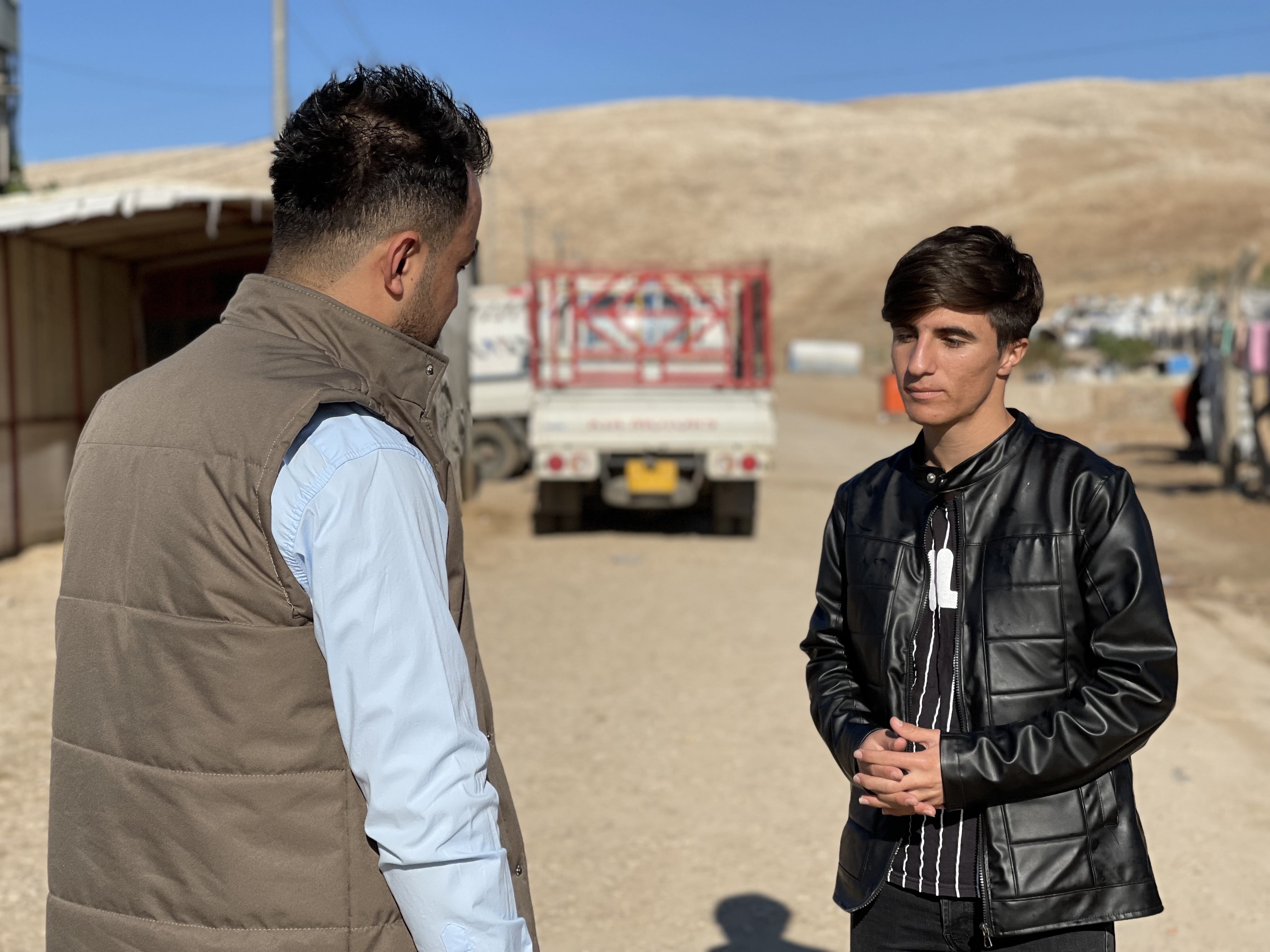Renas Khairo had no chance to enjoy his childhood because of the burdens of displacement. He is and living under a tent in a camp for internally displaced people IDP, and makes hard daily work to earn family living or at least part of it.
Renas is 16 years old but he looks older than his age because displacement has exhausted him psychologically and physically.
"I left school because of poverty as we are a big family and I have to work. My father was a construction worker, but now he is sick and we have no other source of income," Renas told KirkukNow.
The family of Renas is originally from Shingal (Sinjar) district, home to the Ezidi community yet they are living for eight years in Essian camp in Baadri sub-district of Shekhan district, home for more than 2,500 families.
Tens of other kids and teenagers share face the same challenges of Renas due to displacement and they hard daily work they were forced to in order to make the daily living for their families.
“In the summer, I travel one hour and half Bardarash plain (of Dohuk province) to work in a potato field for a daily wage ranging between 10,000 to 15,000 (Iraqi) dinars (USD10), otherwise I transfer concrete bricks. "
“I go out to work early in the morning. If I don't work for one day, we won't be able to make a living,” says Renas. If he doesn't get one of these daily-paid job, he has to sit at home with his two brothers.
I go out to work early in the morning and if I don't work for one day, we won't be able to make a living
According to the Iraqi Labor Law, juveniles of both sexes may not be employed before completing the age of 15, and violations of this law entail penalties.
Shilan Zaidan Khalaf, 16 years old, works alongside her studies to help her family, because her father is deaf and her brother is disabled.
"Our work is harvesting potatoes and tomatoes in the fields for a daily wage of only 6,000 IQD ($4)," said Shilan who shares what she earns with her brother and sister for securing the family's livelihood and buying daily needs and medicines.
“In addition to my work, I carry out household works as well and cook as well which is a big burden for me,” said Sheilan, one of Essian camp IDPs.

Shekhan, January 2022: Shilan Zaidan, 16, attends schools and works to help her family. Karwan Baadri
The provisions of the Universal Convention on the Rights of the Child stipulate that every child has the right to education and a decent life, and children have the right to be protected from doing hazardous work or a job that prevents them from obtaining education or harms their health or growth.
Qaisar Daoud, a psychological researcher who worked with several organizations in the field of helping displaced children, confirmed, "Some of the displaced children work outside the camps and in the fields and do not return to their homes for several days, as they sleep in abandoned buildings and other places."
"These children are deprived of all their rights, some of them have lost their fathers and mothers and they need help, rehabilitation and reintegration into society," Daoud added.
These children are deprived of all their rights
In August 2014, the Islamic State in Iraq and Syria ISIS militants attacked the Ezidis (Yazidis) in Shingal and Nineveh Plains, killing more than a thousand Ezidis, including children. The organization also kidnapped more than 6,000 civlinas, nearly 2,000 children were rescued, and the fate of about 3,000 is still unknown.
Hadi Suleiman, 14 years old, works as a shoemaker and is a student at the same time. “The amount I make daily varies, sometimes 5,000 dinars and sometimes it reaches 10,000, and on some days, it does not exceed 2,000 dinars ($1,3).”
Hadi was displaced with his family seven years ago from the Siba Sheikh Khidr area of Shingal to escape ISIS atrocities mounted to genocide as the United Nations said, and that they have been living since then in Kabartw camp for IDPs, along with more than 2,200 families.
There are more than 664,000 IDPs in the Iraqi Kurdistan Region, some of them are distributed in 26 camps in the northern province of Erbil, Sulaymaniyah and Dohuk, while the others live outside the camps.

Dohuk, January 2022: Renas Khairo (16 years), IDP in Essien camp, talks to (KirkukNow) reporter about his concerns and the difficulty of the work he is doing in order to help his family Photo: Karwan Baadri
Sherzad Hassan, Director General of Social Development in Dohuk, said that he has followed up the file of children labor, especially Ezidi children who have survived the grip of ISIS, and indicated that the Directorate of Social Development organizes continuous courses for entertainment and psychological support for these children and an attempt to keep them away from those tough jobs.
"We have a project with UNICEF for children who are forced to engage in hard and exhausting work because they do not have a source of income, in order to address their problems in this context."
The Directorate of Social Development is pat of the Ministry of Labor and Social Affairs in the Kurdistan Regional Government KRG, and it has opened a house in the Sharya complex to house children who were victims of the ISIS war.
"We plan to provide psychological treatment, food and other supplies to all Yazidi children, and we are seeking through the Ministry of Finance to allocate a symbolic monthly stipend for these children," Hassan added.
According to the Yazidi Survivors Law, which was endorsed by the Iraqi parliament on March 1, 2021, the groups covered by the provisions of this law, are entitled to receive a piece of residential land or a housing unit for free, in addition to opening a number of special centers to provide psychological support to survivors and provide education opportunities for survivors who were abducted and rescued, but this law has not been implemented as it is so far.
* KirkukNow has obtained consent and the approval of the parents of the children interviewed to publish their photos.





